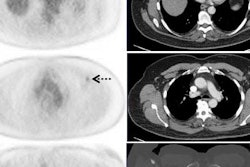
Giving patients knowledge of what to expect from an upcoming FDG-PET/CT scan can go a long way toward helping them to relax and improving their experience, according to a study published online August 3 in the Journal of Nuclear Medicine Technology.
When Swedish researchers provided a web-based tutorial ahead of time, they found that most patients felt their PET/CT experience was easier than expected. On the downside, many patients did not like the length of the scan or being in one fixed position for so long.
"Improved information before an F-18 FDG-PET/CT examination may increase patient knowledge and help them to prepare and undergo the examination. ... The results may be used to improve patient information and care and thereby optimize the F-18 FDG-PET/CT examination procedure," wrote lead author and registered nurse Camilla Andersson, PhD, and colleagues from Uppsala University.
In the study, 110 patients referred for PET/CT scans between October 2015 and December 2016 were randomly placed into an intervention group or a standard care group. All patients received two pages of written information regarding the examination, as well as the time and location of the appointment.
Patients in the intervention group were also given access to a web-based tutorial that featured an eight-minute slideshow with photos and audio. The tutorial gave pre-exam instructions and explained how an FDG-PET/CT scan is performed, what to expect during and after the procedure, and how the results will be delivered.
Total time for the FDG-PET/CT scan (Discovery VCT, GE Healthcare) was between 25 and 30 minutes. The researchers also gave a follow-up survey with a variety of questions about patient experience, interaction with nursing staff, communication, and overall satisfaction.
As one might expect, more subjects in the intervention group (38%) than the standard care group (16%) knew "quite a lot" or "very much" about the PET/CT scan and how it would be conducted.
| Effect of patient tutorial on knowledge of PET/CT scans | ||
| Standard care group (n = 64) | Patient tutorial group (n = 66) | |
| Did you know what an FDG-PET exam was? | ||
| Not at all | 23 (36%) | 25 (38%) |
| Some | 26 (41%) | 17 (26%) |
| Quite a lot | 10 (16%) | 19 (29%) |
| Very much | 3 (5%) | 5 (8%) |
| Did you know how an FDG-PET exam was conducted? | ||
| Not at all | 28 (44%) | 22 (33%) |
| Some | 24 (38%) | 19 (29%) |
| Quite a lot | 9 (14%) | 20 (30%) |
| Very much | 1 (2%) | 5 (8%) |
| Was the exam as you expected? | ||
| Much easier | 5 (8%) | 11 (17%) |
| A bit easier | 17 (27%) | 13 (20%) |
| As expected | 36 (56%) | 36 (55%) |
| A bit worse | 5 (8%) | 6 (9%) |
| Much worse | 1 (2%) | 0 (0%) |
Interestingly, overall satisfaction was high in both the tutorial group (mean score, 28.4) and the standard care group (mean score, 28.8).
Based on their free-text comments, patients were most satisfied with the care provided by the nursing staff (54%), and 24% of patients thought the total procedure was faster than expected. On the other hand, time spent in the scanner, having to remain in one fixed position, and waiting for scan results were the most negative aspects.
Given the relatively small cohort of the study, the "effects of web-based information need to be investigated in a larger sample of patients," Andersson and colleagues concluded.




















